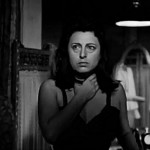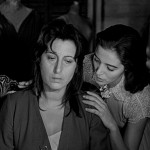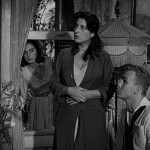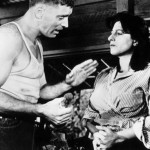
The Rose Tattoo – 1955
This was a strange, quirky, little movie. I would be surprised if many people today have ever even heard of it. I certainly had not when I watched it. It was based on a play by Tennessee Williams, so right off the bat you know that you are going to have an extreme character or two. Williams also wrote other famous plays like A Streetcar Named Desire, Cat on a Hot Tin Roof, The Glass Menagerie, Orpheus Descending, and Sweet Bird of Youth. Typically, his plays are extremely well written, but incredibly intense. The Rose Tattoo was no exception.
It starred, and was actually written for, Italian actress, Anna Magnani. She plays the role of Serafina Dellle Rose, an Italian mother living in Florida. The story opens as she is praising her husband to the neighbors. But that night, her husband, who has a rose tattooed on his chest, is killed in a way that reveals that he is a criminal, smuggling something illegal in his banana truck. It is also made clear that he is cheating on his wife as his mistress also has a rose tattooed on her breast.
Upon learning of her husband’s death, Serafina goes into a crippling depression. She continues her business as a seamstress, but refuses to leave her home. She thinks of her dead husband as a saint that loved her more than anything. In her loneliness, she becomes an unkempt recluse, much to the embarrassment of her teenage daughter, Rosa, played by Marisa Pavan. When Rosa falls in love with a sailor named Jack, played by Ben Cooper, Serafina is overly-protective and harsh.
Well, to sum up the rest of the plot, an unsatisfied customer reveals to Serafina the fact that her husband had been unfaithful. In manic fear and depression, she goes to the priest and demands that he tell her if her husband had ever confessed to the affair. He refuses to tell her and she goes into an uncontrollable rage. In comes Bert Lancaster, playing Alvaro Mangiacavallo, a working class man who takes her back to her home. Unfortunately, he is an idiot whose extreme loneliness causes him to fall hard for Serafina. His advances are clumsy, forceful, and desperate. Drunken awkwardness and near rape ensues and Rosa runs off with the sailor.
Now, all that being said, I’m having a hard time deciding whether I liked the film or not. Anna Magnani gave a good performance, and did the intense role justice. I didn’t like Burt Lancaster at all. Not only did I not like the character, I didn’t like the way Lancaster played him. He made the character of Alvaro seem like he belonged in a loony bin. Someone that moronic would not be able to function in a normal society, and it didn’t have to be that way. His desperation could have been much more subtle and it would have come off as much more believable.
The plot was interesting enough. Not only did it delve into the interesting psychosis of a widow who had never really known how to face reality, but it also showed how her craziness put an incredible strain on her daughter. And while I’m on the subject of Rosa, I’ll also say that Pavan did a pretty good job as well. The character was hopelessly confused. One minuet she hated her mother, the next, she loved her and desired her approval. She kept flip-flopping back and forth, which must have been difficult to portray.
The film was actually nominated for 8 Academy Awards, and won 3 of them. As I mentioned, Magnani won for Best Actress, but it also won for Best Cinematography, and Best Art Direction. Today we would know the Best Art Direction category as Best Production Design, and is awarded for things like set design and decoration. The category at the time was still divided between Black and White, and Color, and the only one of its competitors I have seen was that year’s Best Picture winner, Marty. But I don’t get what was better about the set design and decoration for The Rose Tattoo.
I guess I would have to say that the film was interesting, as opposed to great. Maybe I just don’t know enough about what makes a technically great film. It was good enough to keep my attention, but I didn’t come away from it with a good feeling, either about the plot, or about Lancaster’s acting, though when I think about it, that might not have all been Bert’s fault. Sure he decided to play the part that way, but the director also gave it his stamp of approval. Or maybe… maybe I should be blaming Tennessee Williams!








